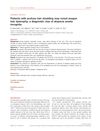 3 citations,
November 2020 in “Curēus”
3 citations,
November 2020 in “Curēus” A child's hair loss from alopecia areata was fully reversed in five months using diet and supplements.
 254 citations,
September 2014 in “Menopause”
254 citations,
September 2014 in “Menopause” The NAMS 2014 recommendations guide healthcare providers on treating health issues in midlife women, emphasizing individualized care and informed decision-making.
 41 citations,
August 2007 in “European Journal of Gastroenterology & Hepatology”
41 citations,
August 2007 in “European Journal of Gastroenterology & Hepatology” A woman's total hair loss from hepatitis C treatment grew back after stopping the medication.
 39 citations,
October 2015 in “Case Reports”
39 citations,
October 2015 in “Case Reports” Some people experience severe, long-lasting side effects from fluoroquinolone antibiotics, leading to the recommendation of limited use and increased awareness of these risks.
 31 citations,
October 2010 in “Journal of the European Academy of Dermatology and Venereology”
31 citations,
October 2010 in “Journal of the European Academy of Dermatology and Venereology” Some people with heavy hair shedding might actually have a hidden form of alopecia, which can be identified by specific hair changes.
 359 citations,
September 2017 in “European Journal of Epidemiology”
359 citations,
September 2017 in “European Journal of Epidemiology” The Rotterdam Study updated findings on elderly health, focusing on heart disease, genetics, lifestyle effects, and disease understanding.
 336 citations,
August 2015 in “European Journal of Epidemiology”
336 citations,
August 2015 in “European Journal of Epidemiology” The Rotterdam Study found risk factors for elderly diseases, links between lifestyle and genetics with health conditions, and aimed to explore new areas like DNA methylation and sensory input effects on brain function.
 281 citations,
January 2013 in “British Journal of Dermatology”
281 citations,
January 2013 in “British Journal of Dermatology” Manage vitiligo with treatments, address emotions, and use camouflage techniques.
 63 citations,
May 2017 in “American Journal of Clinical Dermatology”
63 citations,
May 2017 in “American Journal of Clinical Dermatology” People with alopecia areata often have lower levels of vitamin D, zinc, and folate, but more research is needed to understand if supplements can help treat it.
 21 citations,
January 2016 in “Skin appendage disorders”
21 citations,
January 2016 in “Skin appendage disorders” Alfredo Rebora suggested a new, easier way to classify hair loss in Telogen Effluvium, adding a type possibly related to autoimmune diseases.
 19 citations,
March 2011 in “Cutaneous and Ocular Toxicology”
19 citations,
March 2011 in “Cutaneous and Ocular Toxicology” Some chemicals absorbed through the skin can cause serious health problems.
 17 citations,
February 2011 in “Expert Opinion on Drug Safety”
17 citations,
February 2011 in “Expert Opinion on Drug Safety” Manage side effects of hepatitis C treatment with dose changes and medications, which may improve patient adherence and treatment success.
 15 citations,
April 2003 in “Journal of dermatology”
15 citations,
April 2003 in “Journal of dermatology” Alopecia areata causes hair loss due to an immune attack on hair follicles, influenced by genetics and environment.
 11 citations,
December 2014 in “Clinical Obstetrics and Gynecology”
11 citations,
December 2014 in “Clinical Obstetrics and Gynecology” Obstetrician/gynecologists can diagnose and manage female hair loss with careful history taking and examination.
 11 citations,
July 2014 in “American Journal of Clinical Dermatology”
11 citations,
July 2014 in “American Journal of Clinical Dermatology” People with vitiligo may have a higher rate of Helicobacter pylori infection, but the infection's severity doesn't affect how severe the vitiligo is.
 7 citations,
December 2016 in “British Journal of Dermatology”
7 citations,
December 2016 in “British Journal of Dermatology” The report suggests that hair loss in Cronkhite-Canada syndrome may be caused by alopecia areata incognita, as shown by a patient's improvement with treatment.
 July 2019 in “The European research journal”
July 2019 in “The European research journal” RDW can be a useful marker for inflammation in alopecia areata patients.

Accurate diagnosis and timely, tailored treatments improve outcomes in obstetrics and gynecology.
5 citations,
September 2012 in “BMJ case reports” Ashwagandha may improve hormone levels and reduce hair loss in non-classical adrenal hyperplasia.
 March 2012 in “Hair transplant forum international”
March 2012 in “Hair transplant forum international” Environmental factors and chemicals might affect hormone balance and contribute to common hair loss.
 56 citations,
August 2019 in “Clinical, Cosmetic and Investigational Dermatology”
56 citations,
August 2019 in “Clinical, Cosmetic and Investigational Dermatology” The document concludes that Telogen Effluvium is a hair loss disorder that can be assessed with the modified wash test and may be treated with clobetasol foam, with patient management being important.
6 citations,
September 2023 in “International journal of molecular sciences” Oxidative stress worsens PCOS by damaging cells and disrupting metabolism, suggesting antioxidant treatments might help.
 February 2024 in “Medicina-lithuania”
February 2024 in “Medicina-lithuania” Obesity and bariatric surgery can cause hair thinning and temporary hair loss due to nutritional deficiencies and stress.
 January 2020 in “Archives of Medicine and Health Sciences”
January 2020 in “Archives of Medicine and Health Sciences” Certain immune molecules and stress affect hair loss, and while genes play a role, more research is needed to fully understand and treat it.
 1 citations,
March 2011 in “Infertility”
1 citations,
March 2011 in “Infertility” Hormone imbalances from the pituitary, thyroid, and adrenal glands can cause infertility, but treating these disorders can improve fertility.
 13 citations,
October 2010 in “Pharmacogenomics”
13 citations,
October 2010 in “Pharmacogenomics” Researchers found that most genes affecting drug responses are not fully covered by commercial SNP chips, suggesting the need for more comprehensive tools to optimize drug selection based on genetics.
 2 citations,
January 2014 in “Türkiye klinikleri tıp bilimleri dergisi”
2 citations,
January 2014 in “Türkiye klinikleri tıp bilimleri dergisi” Thyroid autoimmunity may be involved in some female hair loss, suggesting the need to test for thyroid antibodies in these patients.
 January 2023 in “Indian dermatology online journal”
January 2023 in “Indian dermatology online journal” A child with trichothiodystrophy also had autoimmune thyroiditis and anemia, which is a new finding.
 18 citations,
October 2021 in “Frontiers in Physiology”
18 citations,
October 2021 in “Frontiers in Physiology” Lipocalin-Type Prostaglandin D2 Synthase (L-PGDS) is a protein that plays many roles in the body, including sleep regulation, pain management, food intake, and protection against harmful substances. It also affects fat metabolism, glucose intolerance, cell maturation, and is involved in various diseases like diabetes, cancer, and arthritis. It can influence sex organ development and embryonic cell differentiation, and its levels can be used as a diagnostic marker for certain conditions.
 1 citations,
September 2013 in “Elsevier eBooks”
1 citations,
September 2013 in “Elsevier eBooks” Hair ages and thins due to factors like inflammation and stress, and treatments like antioxidants and hormones might improve hair health.




























